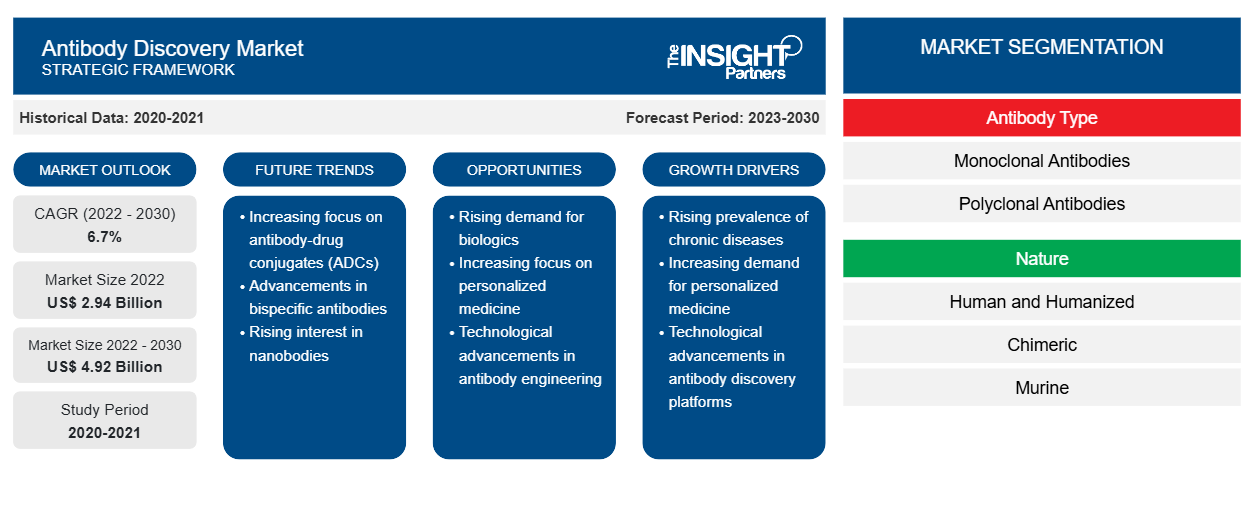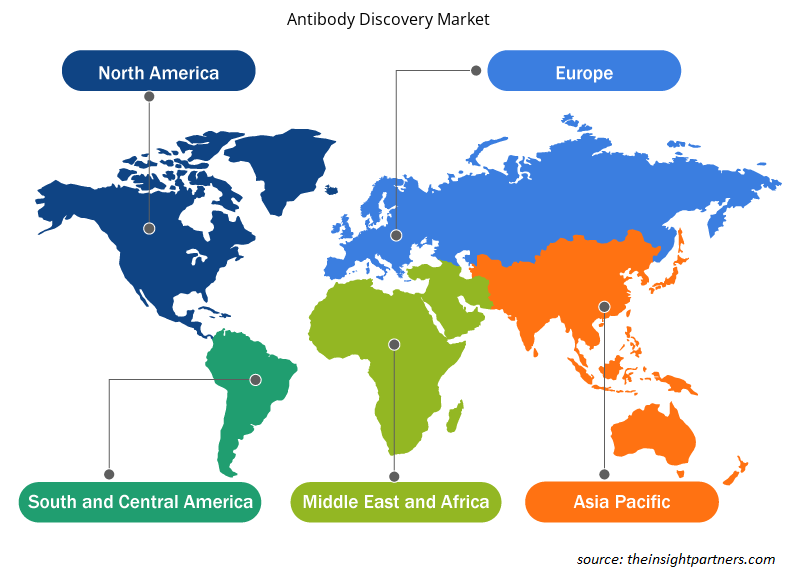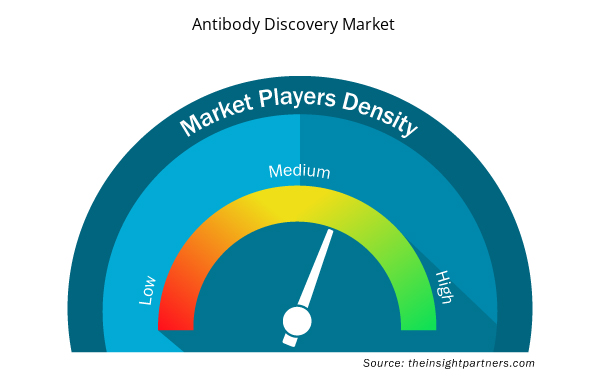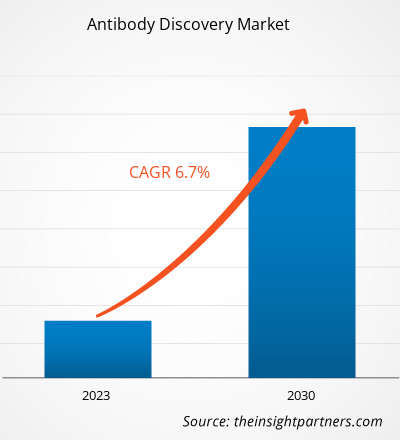[Research Report] The antibody discovery market size is projected to surge from US$ 2.94 billion in 2022 to US$ 4.92 billion by 2030; the market is estimated to grow at a CAGR of 6.7% during 2022–2030.
Analyst Perspective:
The report includes growth prospects owing to the current antibody discovery market trends and their foreseeable impact during the forecast period. Factors such as the increasing prevalence of chronic diseases worldwide and rising demand for personalized medicine fuel the growth of the antibody drug discovery market. The geriatric population is at high risk of chronic diseases such as cancer, autoimmune diseases, and infectious diseases, which reflects a need for biologics and drugs for treatment.
In addition, there is an increasing focus on developing safer antibodies. For example, Humira is a humanized antibody that is less likely to cause side effects than traditional mouse antibodies. Such safer antibodies are expected to become more common with the growing emphasis on drug safety. However, the antibody discovery market growth is limited by stringent regulatory policies and the surging demand for alternative drugs such as gene therapy and small molecule drugs. Additionally, technological advancements such as phage display, high-throughput screening, and bioinformatics are facilitating the discovery and development of new antibodies. This results in a more efficient and cost-effective drug development process and creates lucrative growth opportunities for the market.
Market Overview:
The expansion of biopharmaceutical industry, which is highly focused on biologics, results in a higher demand for antibody research services than before. Increased collaborations between industry players and academic institutions facilitate resource sharing and accelerated antibody discovery. The shift toward patient-centered drug development, emphasizing personalized medicine and patient preferences, boosts the antibody discovery market.
Continued technological advancements such as high-throughput screening, phage display, and next-generation sequencing have resulted in improved efficiency and speed of antibody discovery processes. Increased funding for research and development activities from government organizations and private companies also spurs antibody discovery initiatives. Monoclonal antibodies are gaining popularity in therapeutic applications due to their specificity and effectiveness in targeting specific antigens, resulting in increased demand for antibody research services. Therefore, the growing demand for antibody-based therapies and the preference for outsourcing are likely to have a significant impact on the antibody discovery marketforecast in the next few years.
Customize This Report To Suit Your Requirement
You will get customization on any report - free of charge - including parts of this report, or country-level analysis, Excel Data pack, as well as avail great offers and discounts for start-ups & universities
Antibody Discovery Market: Strategic Insights

- Get Top Key Market Trends of this report.This FREE sample will include data analysis, ranging from market trends to estimates and forecasts.
Customize This Report To Suit Your Requirement
You will get customization on any report - free of charge - including parts of this report, or country-level analysis, Excel Data pack, as well as avail great offers and discounts for start-ups & universities
Antibody Discovery Market: Strategic Insights

- Get Top Key Market Trends of this report.This FREE sample will include data analysis, ranging from market trends to estimates and forecasts.
Market Driver:
Increasing Investments in Research & Development Propel Market Growth
Antibodies, including monoclonal and polyclonal, find applications in academic, research, and pharmaceutical institutes and organizations, wherein they are used in several R&D activities related to drug and biomarker development, and other therapeutic and clinical diagnostics product development. Small and medium-sized companies focus on raising their R&D investments every year. In April 2020, the US federal government assigned US$ 3.5 billion to the Biomedical Advanced Research and Development Authority (BARDA) under its Coronavirus Aid, Relief, and Economic Security (CARES) Act to provide financial support for the manufacturing, production, and procurement of vaccines, diagnostics, therapeutics, and small molecule active pharmaceutical ingredients (APIs), among others. For example, in September 2022, Abzena (a leader in biologics and antibody-drug conjugates) announced intentions to expand its research and development capabilities in Cambridge to aid in rapid antibody discovery. Further, Bio-Rad, a pharmaceutical company, provides 10,000 antibodies, along with antigens, reagents, and buffers, to develop in vitro diagnostic tests. Therefore, the increasing investments by pharmaceutical companies in research and development activities related to antibody discovery to develop better treatment options for various diseases propels the antibody discovery market growth.
Segmental Analysis:
The antibody discovery market analysis has been carried out by considering the following segments: antibody type, nature, services, and end user.
Based on antibody type, the antibody discovery market is segmented into monoclonal antibodies, polyclonal antibodies, and others. The monoclonal antibodies segment held the largest market share in 2022. Moreover, the same segment is anticipated to register the highest CAGR of 6.9% during 2022–2030. Monoclonal antibodies (mAbs) are designed to interact specifically with diseased cells without harming healthy cells. Cancer therapy is one of the significant application areas wherein monoclonal antibodies are used. These are widely accepted biologics and are expected to present a billion-dollar opportunity to pharmaceutical manufacturers during the forecast period. Moreover, patients and physicians are becoming increasingly aware of mAb therapy applications. As a result, the approval of blockbuster mAbs as effective treatments of various indications is expected to favor the antibody discovery market during the forecast period. Drugs such as Avastin, Herceptin, Remicade, and Rituxan have been approved by the FDA for treating cancer, rheumatoid arthritis, Crohn's disease, ulcerative colitis, etc.
The market, based on nature, is segmented into human and humanized, chimeric, and murine. The human and humanized segment held the largest antibody discovery market share in 2022, and the same segment is anticipated to register a higher CAGR during the forecast period. Human and humanized antibodies are engineered genetically by grafting complementarity-determining regions (CDRs) from a non-human antibody with the desired antigen binding specificity into the corresponding CDRs of another antibody, which is more prominently derived from humans. These antibodies are gaining significant acceptance and popularity owing to their higher specificity and stability, and lesser costs. Additionally, human and humanized antibodies have exhibited attractive clinical efficacy in clinical studies.
The antibody discovery market, based on service, is divided into phage display, hybridoma, transgenic animal, yeast display, and single cell. The phage display segment dominated the market share in 2022, and the same segment is anticipated to register the highest CAGR of 7.3% during the forecast period. The phage display technique is used for in vitro antibody selection. Viruses that infect bacteria are mainly used as gene vectors for the expression of antibody fragments (proteins), which are typically single-chain variable fragments (scFv) or Fab fragments present on the virus. The expressed antibody fragments can then be examined for binding to a specific target of interest. Speed, simplicity, and cost-effectiveness associated with the process of identification of binders are among the major advantages of phage display technology.
Based on end user, the antibody discovery market is divided into pharmaceutical and biotechnology companies, research laboratories, and others. The pharmaceutical and biotechnology companies segment held the largest antibody discovery market share in 2022, and the same segment is anticipated to register a higher CAGR of 7.2% during 2022–2030. Pharmaceutical and biotechnology companies account for a significant part of the antibody discovery process because of their capabilities to identify antibodies for any specific disease and produce them on commercial scales. The elevating demand for high-specificity antibodies for drug discovery and development; growing research in the areas of proteomics and genomics; increasing need for antibodies for identifying new targets and assays; and rising R&D activities in several therapeutic areas such as cancer, HIV/AIDS, immunodeficiency diseases, and blood disorders are the critical factors driving the demand for antibody discovery products, solutions, and services in pharmaceutical and biotechnology companies.
Regional Analysis:
The scope of the antibody discovery market report includes North America, Europe, Asia Pacific, the Middle East & Africa, and South & Central America. The market in North America was valued at US$ 1.29 billion in 2022 and is projected to reach US$ 2.20 billion by 2030; it is expected to register a CAGR of 6.8% during 2022–2030. The North American market is segmented into the US, Canada, and Mexico. Market growth in the region is determined by an increase in the prevalence of cancer, the strong presence of the antibody research industry, and technological advancements in the R&D sector.
According to the American Cancer Society, ~1.8 million new cancer cases were diagnosed and ~606,520 deaths related to cancer were recorded in the US in 2020. This bolsters the need for therapeutic antibodies, thereby fueling the market growth. Asia Pacific is expected to register the highest CAGR during 2022–2030. The Asia Pacific antibody discovery market is segmented into China, Japan, India, South Korea, Australia, and the Rest of Asia Pacific. China held the largest market share in 2022, and India is expected to show a significant growth rate in the market. The biopharmaceutical industry in China is undergoing a tremendous shift, evolving from a generics-focused landscape to a thriving innovation hub. Additionally, progress in industrialization, and the application of novel drugs, high-end medical devices, and techniques contribute to the market growth in China. Further, the growing number of market players focusing on countries in Asia Pacific for their geographic expansion and other growth strategies, the rising count of research centers, and a notable increase in government funding fuel the antibody discovery market in Asia Pacific.
Antibody Discovery Market Regional Insights
Antibody Discovery Market Regional Insights
The regional trends and factors influencing the Antibody Discovery Market throughout the forecast period have been thoroughly explained by the analysts at Insight Partners. This section also discusses Antibody Discovery Market segments and geography across North America, Europe, Asia Pacific, Middle East and Africa, and South and Central America.

- Get the Regional Specific Data for Antibody Discovery Market
Antibody Discovery Market Report Scope
| Report Attribute | Details |
|---|---|
| Market size in 2022 | US$ 2.94 Billion |
| Market Size by 2030 | US$ 4.92 Billion |
| Global CAGR (2022 - 2030) | 6.7% |
| Historical Data | 2020-2021 |
| Forecast period | 2023-2030 |
| Segments Covered |
By Antibody Type
|
| Regions and Countries Covered | North America
|
| Market leaders and key company profiles |
Antibody Discovery Market Players Density: Understanding Its Impact on Business Dynamics
The Antibody Discovery Market market is growing rapidly, driven by increasing end-user demand due to factors such as evolving consumer preferences, technological advancements, and greater awareness of the product's benefits. As demand rises, businesses are expanding their offerings, innovating to meet consumer needs, and capitalizing on emerging trends, which further fuels market growth.
Market players density refers to the distribution of firms or companies operating within a particular market or industry. It indicates how many competitors (market players) are present in a given market space relative to its size or total market value.
Major Companies operating in the Antibody Discovery Market are:
- Creative Biolabs
- Evotec
- BioDuro-Sundia
- Bruker Cellular Analysis
- Biocytogen
Disclaimer: The companies listed above are not ranked in any particular order.

- Get the Antibody Discovery Market top key players overview
Key Player Analysis:
Creative Biolabs, Evotec, BioDuro-Sundia, Bruker Cellular Analysis, Biocytogen, Charles River Laboratories, Aragen Life Sciences Pvt. Ltd, Twist Bioscience, NanoCellect Biomedical, and Sartorius AG are among the key players profiled in the antibody discovery market report.
Recent Developments:
Companies operating in the antibody discovery market adopt strategic initiatives such as mergers and acquisitions, partnerships, etc. A few of the recent market developments are listed below:
- In January 2024, Biocytogen Pharmaceuticals Co Ltd launched a new sub-brand named RenBiologics to represent the company’s Antibody Discovery business division. RenBiologics business is expected to cover the out-licensing/co-development of the company’s extensive library of fully human antibodies, as well as the licensing of RenMice, a fully human antibody/TCR discovery platform of Biocytogen Pharmaceuticals.
- In December 2023, Biocytogen Pharmaceuticals Co Ltd announced an antibody evaluation, option, and license agreement with Ona Therapeutics to design biopharmaceuticals against advanced cancer types. Under the terms of the agreement, Biocytogen Pharmaceuticals Co Ltd granted Ona access to evaluate its proprietary RenMice-derived fully human antibodies against a specific tumor target, with an option to exclusively license selected antibodies for the development, manufacturing, and commercialization of antibody-drug conjugates (ADCs) in mutually agreed indications and territories.
- In June 2022, Evotec SE announced a collaboration with Janssen Pharmaceutica NV, one of the companies of Johnson & Johnson for drug discovery. Under the collaboration, Evotec SE is meant to evaluate its TargetAlloMod platforms for the discovery of first-in-class therapeutic candidates with novel modes of action and Janssen Pharmaceutica NV will facilitate the same.
- In August 2021, Sartorius AG entered into a partnership with McMaster University to improve the manufacturing processes of antibodies and other virus-based treatments for diseases such as COVID-19, cancer, and genetic disorders. This partnership with McMaster University led to impactful research that made important treatments available at a greater scale.
- Historical Analysis (2 Years), Base Year, Forecast (7 Years) with CAGR
- PEST and SWOT Analysis
- Market Size Value / Volume - Global, Regional, Country
- Industry and Competitive Landscape
- Excel Dataset



Report Coverage
Revenue forecast, Company Analysis, Industry landscape, Growth factors, and Trends

Segment Covered
Antibody Type, Nature, Service, End User, and Geography

Regional Scope
North America, Europe, Asia Pacific, Middle East & Africa, South & Central America

Country Scope
This text is related
to country scope.
Frequently Asked Questions
Charles River Laboratories and Evotec are the top two companies that hold huge market shares in the antibody discovery market.
Global antibody discovery market is segmented by region into North America, Europe, Asia Pacific, Middle East & Africa, and South & Central America. The North America regional market is expected to grow with a CAGR of 6.8% during 2022–2030. Market growth in this region is attributed to the increasing prevalence of cancer, the strong presence of the antibody research industry, and technological advancements in the R&D sector help in the market expansion. An upsurge in funding further enables the development of new technologies, pooling of resources and expertise across countries and organizations, and conducting research work into existing antibody treatments. This has led to a better understanding of the immune system, and the development of effective and targeted antibodies. Additionally, the increased funding allows scientists to conduct large-scale clinical trials that are mandatory to evaluate the effectiveness of a particular antibody. The Asia Pacific molecular spectroscopy market is expected to grow at the highest CAGR of 7.3% during 2022–2030. China is predicted to hold the largest share of the market in 2022, and India is expected to show a significant growth rate in the market. China is predicted to hold the largest market share in 2022, and India is expected to show a significant growth rate in the market. The biopharmaceutical industry in China is undergoing a tremendous shift, evolving from a generics-focused landscape to a thriving innovation hub. Additionally, progress in industrialization, and the application of novel drugs, high-end medical devices, and techniques contribute to the antibody discovery market growth in China. Further, the growing number of market players focusing on countries in Asia Pacific for their geographic expansion and other growth strategies, the rising count of research centers, and a notable increase in government funding fuel the antibody discovery market growth in Asia Pacific.
Antibody discovery, a nuanced endeavor, refers to the complicated process of discovering novel antibodies. This endeavor involves the search for antibodies that recognize and bind to specific targets, with applications extending to diagnostics and therapy. Antibody discovery methods such as phage display and hybridoma technology are widely used. Their use is essential to the search for antibodies that recognize and bind to specific targets, paving the way for applications in diagnostics and therapeutic interventions. The resulting outcome of this process plays a crucial role in developing novel drugs, vaccines, diagnostics, and various therapeutic modalities. By enabling researchers to produce antibodies tailored to recognize and target precise antigens, the scale of antibody discovery is of paramount importance.
Key factors that are driving the antibody discovery market are the increasing investments in research & development and the rising incidence of cancer.
The CAGR value of the antibody discovery market during the forecasted period of 2022-2030 is 6.7%.
The monoclonal antibodies segment held the largest share of the market in the global antibody discovery market and held the largest market share of 82.6% in 2022.
The phage display segment dominated the global antibody discovery market and held the largest market share of 35.8% in 2022.
The molecular spectroscopy market majorly consists of the players such Creative Biolabs, Evotec, BioDuro-Sundia, Bruker Cellular Analysis, Biocytogen, Charles River Laboratories, Aragen Life Sciences Pvt. Ltd, Twist Bioscience, NanoCellect Biomedical, and Sartorius AG.
Trends and growth analysis reports related to Life Sciences : READ MORE..
The List of Companies - Antibody Discovery Market
- Creative Biolabs
- Evotec
- BioDuro-Sundia
- Bruker Cellular Analysis
- Biocytogen
- Charles River Laboratories
- Aragen Life Sciences Pvt. Ltd
- Twist Bioscience
- NanoCellect Biomedical
- Sartorius AG

 Get Free Sample For
Get Free Sample For